A Global Vision of the Gospel: The Coming Collapse of Evangelicalism in the Developing World (III)
The Evangelical church in the Developing World is like a ship sailing blithely along without realizing that there’s an enormous hole under the water, and it will soon sink.
04 FEBRUARY 2015 · 09:30 CET

The Evangelical church in the Developing World is like a ship sailing blithely along without realizing that there’s an enormous hole under the water, and it will soon sink. The Gospel has grown enormously in the Majority World over the last 100 years. But the foundations of this worldwide church expansion are weak. Like ivy, Evangelicalism spreads fast but has shallow roots and can be quickly ripped up.
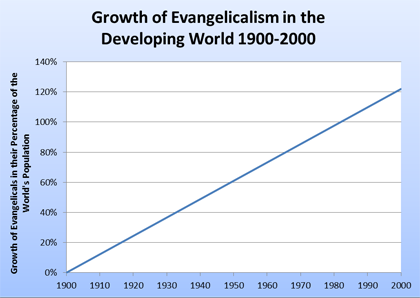
Today, the situation of the Developing World’s Evangelical movement is startlingly similar to that of British Evangelicalism in 1850.
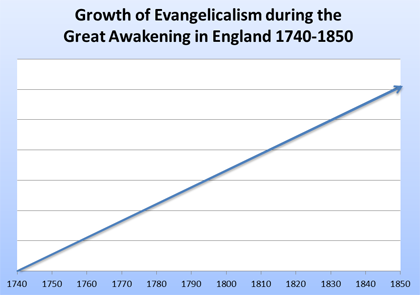
God used John Wesley 275 years ago to start a spiritual awakening. The Great Awakening in England, from 1740 to 1850, provides an uncanny historical parallel for the Developing World’s Evangelicalism from 1900 to 2000, and it also helps us to understand Europe’s current condition.
Wesley ministered during a time known as “the Gin Age,” in which drunkenness reached epidemic proportion. Eighteenth-century England was characterized by aristocratic indulgence, lower-class poverty, religious compromise and negligence, and a widespread immorality. Sexual promiscuity was commonplace among all classes of English culture, as half of all babies were born out of wedlock. Popular sports were characterized by cruelty, coarseness, and the torture of animals such as cockfighting and bear-baiting.
It was to this culture and people that John Wesley communicated the truth and led a renewal movement. Wesley’s message was a response of truth to the difficulties and problems he faced. That message emphasized these points:
- In response to the unrealistic optimism toward human nature, Wesley taught on the sinfulness of humanity.
- In response to the then-current view of salvation by works, Wesley taught salvation by faith.
- In response to the moral disorder of a gin-drinking, gambling and lewd society, Wesley taught the importance and imperative of holiness.
- In response to the social problems of materialism, slavery and exploitation of workers, Wesley taught the biblical value of each person.
- In response to a spiritual deadness in the church, Wesley taught and lived a reality of an experience with God.
God used Wesley to lead an enormous expansion of the Gospel and the changing of a culture. By the time of Wesley’s death, there were more than 100,000 Wesleyans meeting regularly in small groups for spiritual growth. Over the course of 100 years, this Evangelical revival had changed the culture. Eventually slavery was eliminated not only in England, but also the rest of the British Empire. Laws to protect children and prevent cruelty to animals, as well as dozens of other initiatives, were passed for the first time in Parliament.
At the very end of Wesley’s life, William Wilberforce wrote a letter to Wesley concerning God’s calling on his life to fight slavery. Wesley responded, “Unless God has raised you up for this very thing, you will be worn out by the opposition of men and devils. But if God is before you, who can be against you? Are all of them together stronger than God? O be not weary of well doing!”1 Wilberforce fought against slavery over the next four decades. Three days before he died, slavery was eliminated throughout the British Empire. Wilberforce and tens of thousands of other Wesleyans reflected the character of Christ into the culture. The Gin Age, by means of the Evangelical renewal, was transformed into the Victorian Age, in which many families had daily devotions.
MODERN-DAY WESLEYS IN TODAY'S DEVELOPING WORLD
Because of his impact in evangelism and reflecting the character of Christ into the culture, Wesley is used as a model for ministry in modern times. God has raised up many contemporary Wesleys in today’s Developing World. These people are:
- Communicating the Gospel effectively
- Planting churches by the hundreds
- Leading thriving national movements
- Developing lay-leadership training initiatives
- Confronting cultural evils like sex trafficking, prostitution, etc.
- Leading political initiatives to reflect Christ’s character
In short, we see local, national and regional movements in the Majority World that are addressing the very issues that Wesley addressed in his day.
Wesley is a valuable model for the Developing World to study because of his great success. But he is even more important to study because of his great failure.
As we know, this trend of growth didn’t last. The Great Awakening was followed by a shocking decline of Christianity in England.
According to the a national census of religious worship in 1851, 34.2% of the population of England attended church (of any Christian denomination) on Sunday, March 30, 1851.2 However, average weekly church attendance has declined substantially to only 11.1% of the population by 1979 and further declined to only 6.3% by 2005.3
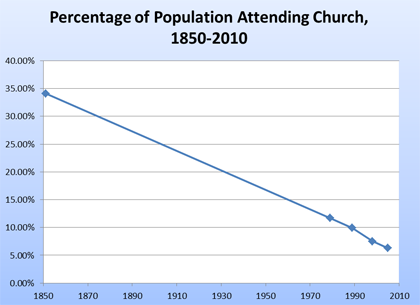
WHAT HAPPENED TO THE GREAT AWAKENING?
Wesley did not prepare the church for the challenges that eventually destroyed it. His focus was on popular evangelism, spiritual growth for believers, and cultural change – like most Evangelicals today.
Wesley’s goal was “to spread scriptural holiness over the land.”4 He was very effective in this. Like spiritual ivy which spread quickly, the Gospel took root and grew widely in the lower classes of English society.
What happened?
THREE INTELLECTUAL TORNADOES UPROOTED EVANGELICALISM
Three new developments were critical in undermining the foundation of the Evangelical church in the latter half of the 19th century: Enlightenment Philosophy, Skeptical Biblical Criticism, and Darwinian Naturalism. Evangelical Christians lacked adequate answers for the new questions that confronted them. As a result, today the Evangelical church in England is small and relatively weak.
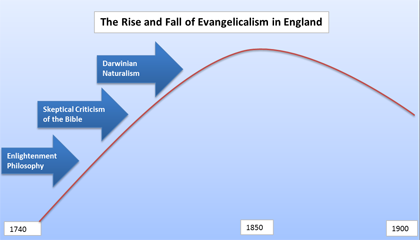
1. ENLIGHTENMENT PHILOSOPHY
In its early days, the Enlightenment was not a rebellion against theism, but was in many areas inspired by the Christian faith. Many of the early members of the British Royal Society, which led the first stage of the Scientific Revolution, were orthodox believers. Others like Isaac Newton were convinced theists who sought to understand both “God’s book” (the Bible) and “the book of nature.” Properly understood, Christianity was the mother of the Scientific Revolution.
But as the Enlightenment grew, it became more deistic and agnostic in outlook. Denis Diderot, one of the leaders of the French Enlightenment, ends his book with an agnostic prayer: “O God, I do not know if you exist… I ask nothing in this world, for the course of events is determined by its own necessity.”5 According to this Enlightenment perspective, God is probably not there, but if He is, He is irrelevant. Coming at the end of the Enlightenment, the philosopher Immanuel Kant argued that the very category of “knowledge” was only possible with sensory objects. Viewed through the prism of the Enlightenment, the Christian God was distant and unknowable – if He existed at all. The idea that someone could know Him or truth about Him was defined as impossible.
2. SKEPTICAL BIBLICAL CRITICISM
As the influence of the Enlightenment Philosophy spread, other fields of thought began to operate from these new philosophical presuppositions. One of the most significant fields of influence of the Enlightenment was filtered thought through the prism of Skeptical Biblical Criticism. One scholar summarizes this influence:
“(B)iblical criticism has been a principal tool in the critique of classical theology by forces of the Enlightenment. By subjecting the Bible to humanistic presuppositions and treating it as a merely human text under the control of our superior techniques, we have seen the message relativized and debunked time and again.6
Skeptical Biblical Criticism, shaped by the Enlightenment’s presuppositions, treats the Bible as one more human book and presupposes that God could not give revelation in the Scripture.
Perhaps more than any other single factor, Skeptical Biblical Criticism has attacked the idea that God has revealled His truth in the Bible. Like an axe that cuts the main root of a tree and leaves the tree to slowly rot, Skeptical Biblical Criticism undercut Christians’ faith. Instead of the Bible being a respected, even authoritative, voice, it becomes one more object to be scrutinized by an Enlightenment-based philosophical method.
3. DARWINIAN NATURALISM
Darwin’s theory of evolution broke apart the last foundations of a Christian worldview in England. By the time Darwin wrote On the Origin of the Species in 1859, the Enlightenment’s ideas had already permeated the educated classes. Many found in Darwin the explanatory mechanism for the naturalistic worldview that they already believed. Darwin argued that all species of life have common ancestors and evolved by a process of natural selection. Within his own lifetime, his ideas were widely accepted by the academic and educated elite. To this day, Darwin’s ideas are pervasively influential in the scientific world. One modern leading advocate of evolution correctly understands that Darwinian Naturalism was a “universal acid”7 that dissolved the Christian worldview. If people are only animals who are the result of an evolutionary process of time and chance, there is no basis for belief in God or for objective standards of right and wrong. Even to this day, many people across Europe believe that science has buried Christianity.
THE CRISIS OF FAITH AND BIRTH OF MODERN UNBELIEF
During the second half of the 19th century in England, an entire generation of Christians was swept off its feet. The effect of the Enlightenment Philosophy, Skeptical Biblical Criticism, and Darwinian Naturalism seemed overpoweringly true. Enlightenment unbelief was simultaneously promoting an alternate worldview and destabilizing the established Christian worldview.
Enlightenment thinking pushed Christian believers toward the untenable position of one foot in the rowboat of their Christian worldview, and the other foot in a rowboat of their education which was shaped by Enlightenment ideas – with the two being slowly pulled apart.
In this situation, believers felt a cognitive dissonance between the Enlightenment and Christian worldviews. Anomie is the word commonly used to describe the disorienting experience of a lack of meaning in one’s life. Sociologist Peter Berger defines anomie as “a condition of rootlessness, disorientation, of no longer feeling at home in the world.”8 The root of the word anomie is nomos – the Greek word for law. To lose one’s worldview is to be left lawless or without norms. One who experiences anomie feels disoriented and becomes correspondingly more open to considering a new worldview. As a result of this growing tension of anomie, believers were tempted to accept one of these alternatives:
a) Convert to agnosticism.
b) Adopt much of the Enlightenment’s worldview, but seek to retain Christian terminology in what came to be called “liberal theology”.
c) Retreat into a privatized faith and reject the idea that Christians are called to persuasively communicate why the Gospel is true.
All three of these occurred. Many Christians became agnostics, others became liberals seeking to keep the Christian language, but without its historic content, and those who remained orthodox often withdrew from the world in pietistic huddles in their attempts to remain faithful. As a result, all the English church denominations have been declining over the last 160 years.
The extent of this decline today was highlighted in the responses to the religious identification question on the 2001 and 2011 Censuses in England and Wales, depicted in the graph below. Between 2001 and 2011, the percentage of the population reporting “No religion” increased from 14.8% to 25.1%, more than a 66% growth in unbelief in only 10 years.9
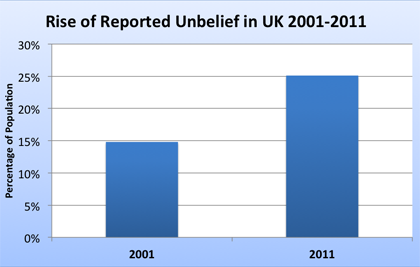
WHAT IS THE LESSON FROM THE FAILURE OF THE GREAT AWAKENING?
“Those who cannot remember the past are condemned to repeat it.”10 In other words, either you learn from history, or you stumble into the same mistakes or failures of those who went before you.
In 1850, the British Evangelical movement was on the verge of collapse, yet its members didn’t know it. They had witnessed an amazing 110 years of evangelistic success and social renewal, and they thought the movement would continue in a positive direction. But the gales and tornadoes of the Enlightenment ripped up the Evangelical ivy, and England was left with a devastated church.
Today’s Evangelical movement in the Developing World is vulnerable to the same attack that hurt the British Evangelical movement after 1850. In fact, the Developing World has already caught the deadly virus of unbelief. It is growing in the incubators of Developing World universities and expanding across the world.
The model of the Great Awakening makes us more aware of both the problems of Europe’s situation and of the vulnerability of the Developing World to Europe’s disease of unbelief.
We have evaluated part of the reason why Christianity is being undermined in the Developing World through the external threat of unbelief. But this problem, like most difficult issues, has multiple causes. We must also understand the characteristics of Evangelical Christianity and why it is vulnerable to this kind of attack.
Come back next week to examine the Evangelical ivy more closely.
Statistics regarding the Evangelical church in the Developing World are taken from the World Christian Encyclopedia, Volume 1, (Ed. David B. Barrett).
Graphs on Evangelicalism in England over time are depictions of historical trends, unless otherwise noted.
1 Letter from Wesley to Wilberforce (1791). http://www.umcmission.org/Find-Resources/John-Wesley-Sermons/The-Wesleys-and-Their-Times/Letter-to-William-Wilberforce
2 Census of Great Britain, 1851. Religious Worship in England and Wales.(1851). https://archive.org/details/censusgreatbrit00manngoog.
This data represents the only time that a study of this scope was undertaken by the government concerning Christianity in England. Since this study only measured attendance on a single Sunday, this could indicate a much larger number of regular attenders. If people attended church a couple of times a month, this could suggest that well over 50% of the English population was regularly attending church at this time, accounting for absentees on a given Sunday.
3 British Religion in Statistics. “Church Attendance in England 1980 – 2005.” http://www.brin.ac.uk/news/2011/church-attendance-in-england-1980-2005/
4“Minutes of Several Conversations” Q.3, in The Works of John Wesley [vol. 8; ed. T. Jackson; Baker, 1978] 299)
5 Norman Hampson, The Enlightenment: An evaluation of its assumptions, attitudes and values (1968).
6Clark H. Pinnock, The Scripture Principle: Reclaiming the Full Authority of the Bible (1984).
7Daniel Dennett, Darwin’s Dangerous Idea: Evolution and the Meaning of Life (1995).
8Peter Berger, Sociology Reinterpreted: An Essay on Method and Vocation, p. 148
9 “Religion in Wales and England 2011.” http://www.ons.gov.uk/ons/rel/census/2011-census/key-statistics-for-local-authorities-in-england-and-wales/rpt-religion.html#tab-Changing-picture-of-religious-affiliation-over-last-decade
10 George Santayana, The Life of Reason: Reason in Common Sense. Scribner’s (1905).
Greg Pritchard earned his MA from Trinity School of Divinity before continuing on to finish his PhD at Northwestern University. The intersection of theology, history, philosophy and sociology is Greg’s primary focus both in teaching and writing. He has taught graduate-level courses on apologetics, theology, history, leadership, the New Testament, ethics, and Christian Thought at American, European, and Asian institutions of higher learning. His book, Willow Creek Seeker Services, has been published in four languages. In addition, Greg has worked as the COO at a Chicago investment firm. Currently, he serves as the President of the Forum of Christian Leaders and as the Director of the European Leadership Forum.
The Forum of Christian Leaders (FOCL) is the sponsor of the European Leadership Forum (ELF), which seeks to unite, mentor, and resource European evangelical leaders to renew the biblical church and re-evangelise Europe. This happens first at the ELF's annual meeting that occurs each May in Poland. In addition to the ELF, FOCL is host to an online media library and learning community for evangelical Christians. Learn more at foclonline.org and euroleadership.org; or join us on Twitter @FOCLonline and Facebook Forum of Christian Leaders.
Published in: Evangelical Focus - Forum of Christian Leaders - A Global Vision of the Gospel: The Coming Collapse of Evangelicalism in the Developing World (III)
